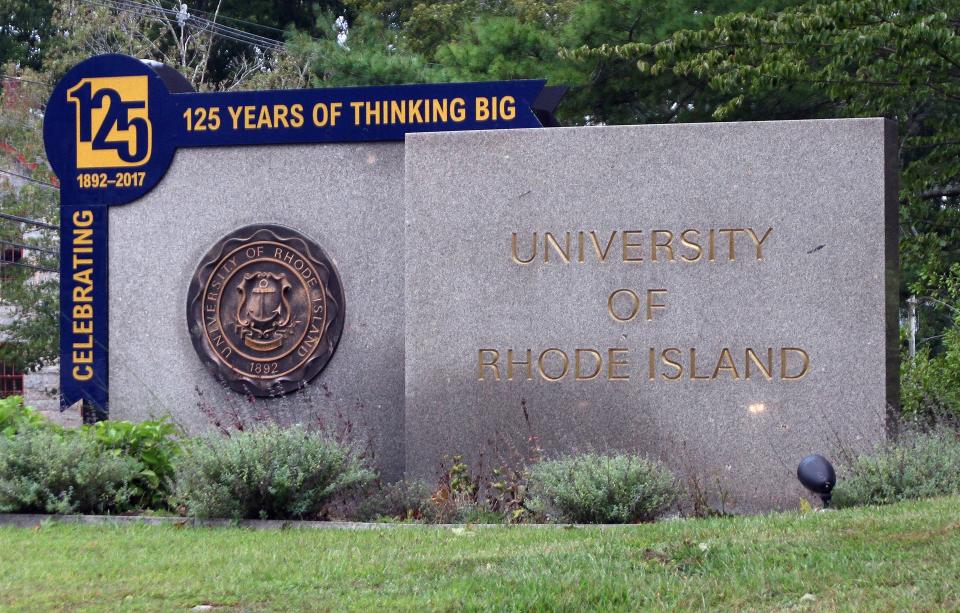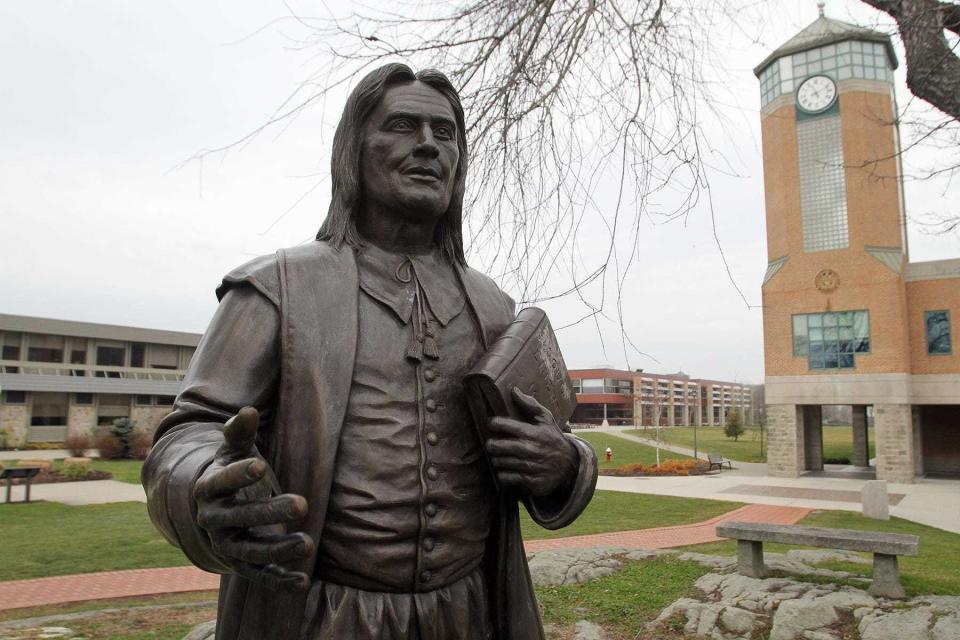RI politicians say they went to URI, CCRI and JWU. Did they really graduate? We checked.
- Oops!Something went wrong.Please try again later.
- Oops!Something went wrong.Please try again later.
There's a long-standing joke that Rhode Island politicians all seem to follow the same well-trodden path to the State House: La Salle Academy, Providence College, Suffolk University Law School.
But does it still ring true? Between the state's five general officers, three representatives currently serving in Congress, and the 112 sitting members of the General Assembly, there's not one elected official with that exact résumé.
In fact, there's a surprisingly wide range of educational diversity to be found on Smith Hill, where Brown University Ph.D.s and a Rhodes scholar serve alongside legislators who hold only high school diplomas.
State lawmakers without four-year college degrees appear to outnumber those who hold law degrees or attended Ivy League institutions, Political Scene found in an analysis of top elected officials' educational credentials. By contrast, Rhode Island's congressional delegation is exclusively Ivy League graduates, all of whom hold advanced degrees.
To get a full picture of politicians' educational backgrounds, Political Scene compiled information from the Rhode Island Government Owner's Manual, which typically lists the colleges that elected officials attended or degrees that they hold, as well as the more detailed biographies available on official state websites.
More: Meet the fence viewer, Rhode Island's quaintest government position.
Additional details came from campaign websites, public LinkedIn and Facebook profiles, past news stories and lawmakers themselves, when necessary.
Inspired by a Detroit Free Press investigation that uncovered multiple false claims by members of the Michigan Legislature, Political Scene also contacted more than 60 colleges and universities in an attempt to verify that each lawmaker actually earned the diplomas that they purport to have received.
As of press time, about a quarter of the schools had yet to respond or confirm individual degrees, but the review did unearth inaccurate claims in three lawmakers' biographies: House Minority Leader Michael Chippendale, Sen. Joshua Miller and Sen. John Burke.
Inaccurate claims found in three lawmakers' biographies
As of Friday afternoon, Miller’s legislative biography described him as “a graduate of Hope High School and the University of Rhode Island,” and his campaign website also stated that he was an alumnus of both schools.
However, URI was unable to confirm that the Cranston Democrat had earned a degree.
"I attended URI but did not graduate," Miller wrote in an email, when asked to clarify.
Senate spokesman Greg Paré subsequently told Political Scene that the wording in Miller's legislative biography had been his mistake.
He said that lawmakers' biographies had previously been in a different format that listed where they went to college but did not necessarily say whether they graduated, and that the mistake came about when Senate staff used that information to write up biographical sketches of each legislator.
Paré said that process also led to an error in Burke's biography, which states that he studied at the Community College of Rhode Island and began working in information technology "upon graduation." Burke did not actually graduate from CCRI, though he had enough credits to do so, and went to work instead.
Both senators' biographies will be corrected on Monday, Paré said.
Before Political Scene raised questions, Chippendale's legislative biography stated that he "obtained a degree in Business Management from Johnson & Wales University in 2004."
JWU spokeswoman Jennifer McGee said that Chippendale had been enrolled at the university but did not receive a degree.
Political Scene left a message for Chippendale at his State House office after learning about the discrepancy. Sue Stenhouse, the chief of staff for House Republicans, returned the call the following morning and said that Chippendale was at a conference and that his online biography had been corrected.
That biography now states, "Mike re-entered college in 2004 at Johnson and Wales University, studying business management."
Stenhouse said that, by sheer coincidence, she had recently asked all the members of the Republican caucus to review and update their biographies.
"We knew about that," she said of the erroneous claim.
Chippendale did not write the biography himself, Stenhouse said. Legislators' biographies are typically written by staff, she said, and it's possible for some details to get misinterpreted. The lawmakers "just approve them," and it's possible that they might only briefly glance at the information, she said.
Stenhouse said Chippendale did earn an associate's degree from the New England Institute of Technology. The school did not respond to inquiries by press time, but an article published in The Providence Journal in 1990 listed Chippendale among the graduates who received diplomas at NEIT's commencement ceremony, confirming the validity of that claim.
Which colleges and universities produce the most Rhode Island politicians?
Although none of Rhode Island's general officers or congressional representatives are graduates of the state's flagship public university, the University of Rhode Island appears to count more state-level elected officials as alumni than any other institution of higher learning.
Twenty of the 112 current members of the General Assembly – almost 20% – say that they earned at least one degree there.

Rhode Island College is a close runner-up: 18 state lawmakers earned degrees there, as did Lt. Gov. Sabina Matos.
Providence College ranks third, counting 15 legislators and the secretary of state as graduates.
Eight members of the General Assembly list degrees from CCRI in their biographies, while at least eight others attended the community college but did not earn a diploma there. It's likely that the number of lawmakers who studied at CCRI at some point is even higher, since those who transferred to other institutions may only mention the school they ultimately graduated from.
State Treasurer James Diossa also attended CCRI before transferring to Becker College in Worcester, Massachusetts, which has since closed.
Eight members of the Assembly earned diplomas at Brown University, as did U.S. Rep. Seth Magaziner. Seven hold degrees from Roger Williams University, and four received degrees from Bryant University.
In total, more than 60 lawmakers hold at least one degree from a college or university in Rhode Island, meaning that more than two-thirds of the college graduates in the General Assembly were educated locally. (More than a dozen of those lawmakers hold degrees from more than one local institution, meaning they count toward multiple schools' tallies.)
Which elected officials have Ivy League degrees?
Rhode Island's congressional delegation is entirely Ivy League graduates.
Magaziner has a bachelor's degree from Brown and a master's degree from Yale. Sen. Sheldon Whitehouse received a bachelor's degree from Yale, and Sen. Jack Reed earned a master's degree in public policy and a law degree from Harvard.
Either one of the candidates vying to fill the vacant seat in the 1st Congressional District would buck the trend: Gabe Amo attended Wheaton College, and Gerry Leonard went to Hartwick College.

Among the state's five general officers, Gov. Dan McKee is the only Ivy Leaguer: He holds a master's degree from Harvard's Kennedy School of Government.
Meanwhile, in the General Assembly, 10% of lawmakers hold an Ivy League degree. In addition to the eight Brown graduates, the list includes alumni of Columbia University's Barnard College, Harvard University, the University of Pennsylvania and Yale University.
Sen. Sam Zurier, who holds two degrees from Yale, also holds the distinction of being the only Rhodes scholar.
How many members of the General Assembly went to law school, or have advanced degrees?
At least 88 of the 112 members of the General Assembly earned a bachelor’s degree from a four-year college, according to Political Scene’s analysis.
Some 48 lawmakers – or slightly more than half of that group – also indicated that they have at least one advanced degree.
Twenty-one legislators, who amount to nearly 20% of the Assembly, hold law degrees. The majority attended one of three law schools: Roger Williams University School of Law, Suffolk University Law School, or New England Law in Boston.
Each of those schools currently claims four alumni in the General Assembly, but RWU could soon break the tie: Jake Bissaillon, a RWU law graduate, is seen as the favorite to fill the vacant seat in Senate District 1. Two House members, Rep. Katherine Kazarian and Rep. Brandon Potter, are also earning law degrees from RWU.

Among lawmakers who earned other advanced degrees, the most common credential was a master's degree in education. There are also a handful of legislators who hold master's degrees in business administration or public administration.
While there are no medical doctors in the General Assembly, there is one optometrist: Rep. Arthur "Doc" Corvese, who earned his doctor of optometry degree from the New England College of Optometry after graduating from Providence College.
And there are five members who could technically claim the title of "doctor" because they've earned doctorates.
On the Senate side, the list includes Sen. Samuel Bell and Sen. Meghan Kallman, who both received Ph.D.s from Brown. Bell studied in earth, environmental and planetary science, while Kallman's degree is in sociology.
Members of the House with doctorates include Rep. Justine Caldwell, who received a Ph.D. in American studies from Bowling Green State University; Rep. June Speakman, who holds a Ph.D. in political science from City University of New York; and Rep. Mary Ann Shallcross Smith, who obtained a Ph.D. in youth studies/leadership from Nova Southeastern University in Florida.
How many lawmakers do not have college degrees?
At least 19 members of the General Assembly do not appear to hold college degrees.
That number includes lawmakers who list high school diplomas as their only educational credentials, those who earned professional certificates rather than degrees, and those who mention attending college in their biographies but do not claim to have received a diploma. (College officials were able to confirm that most lawmakers in the latter category had been enrolled at one point but did not graduate.)
An additional five legislators indicate that they obtained associate's degrees but did not go on to earn a bachelor's degree from a four-year college.
Tallied together, state lawmakers without four-year college degrees make up 21% of the General Assembly.
That's slightly lower than the national average: In 2011, the Chronicle of Higher Education surveyed legislatures across the country and found that about a quarter of lawmakers nationwide did not possess a four-year college degree.
It also means that the legislature is more educated than the state overall: About 40% of Rhode Islanders hold a bachelor's degree or higher, according to Census data, compared with 79% of legislators.
In higher-ranking positions, the question isn't whether an elected official earned a degree, but how many.
All five of Rhode Island's general officers have bachelor's degrees, and only Matos and Diossa do not hold advanced degrees. On the federal level, all three sitting members of Rhode Island’s congressional delegation hold advanced degrees.
This article originally appeared on The Providence Journal: Did RI lawmakers really earn the college degrees in their bios?

